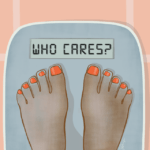Maybe you were “good” all week long. You stayed on track with your calories, got all of your workouts in, and lost a pound or two. You feel on top of the world, until Saturday night rolls around.
You’re rushing around all day and don’t have the time to eat, or you’re saving all of your calories to go out for that dinner with friends, or you’re feeling incredibly anxious, or maybe you have just been harder on yourself lately. Either way, 7 pm rolls around and suddenly all you can think of is food. And not just one food, all the foods.
So, you decide a handful of chips won’t hurt or maybe a brownie. And that tastes really good, so you eat a little more, but this time you grab some ice cream. And then a slice of pizza. And then some oatmeal. And so on, until a snack becomes a full-blown binge.
When it’s all over, you are left panicking and preparing for the next diet. This is exactly where so many people go wrong. I know for a lot of people, the diet-binge cycle is all too familiar. It can feel tiring, hopeless, and all-consuming. But it doesn’t need to be forever. Here are five things you can do after a binge, that not only help you break the cycle of binging but bring you a few steps closer to healing your relationship with food and your body.
- Remain calm and be gentle with yourself – what happened has happened, it’s okay. However, it is really easy to feel anything but safe when you are constantly beating yourself up and tearing yourself down. This can sabotage your ability to move forward.
- Reframe your mindset – binging is your body’s response to starvation (aka extreme dieting) or your response to overwhelming emotions and discomfort. In both situations, you are fighting for survival. This is a sign of resilience. Resilience is a strength.
- Reflect – consider what was happening before, during, and/or after a binge. What were you feeling? Did you eat enough throughout the day? Were you mean to yourself for what you were eating during the day? This can help you identify triggers, develop coping skills, and create interventions.
- Redirect your energy – rather than investing energy into restricting or over-compensating for calories eaten, invest in abundance. Eat consistently, eat enough, and eat what you are craving. If you restrict, the cycle will persist.
- Remember your worth is not dependent on your body – While you should spend some time reflecting on what happened, it’s also important to move on. It may be best to spend the day after doing things that bring you joy and remind you there is more to life than food and your body. Self-care is also another great option. Instead of punishment, spend the day after taking care of your body, as that is all it is trying to do for you.
The diet-binge cycle is not something that can be broken overnight. And there will be more binges in recovery, however, if you follow this approach they will decrease over time. Don’t be afraid to seek support or check out coaching opportunities to begin healing your relationship with food and your body. It is possible to heal, trust me.


